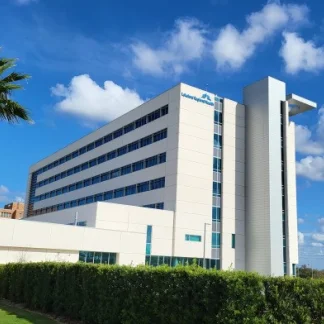Central Florida Human Services
Central Florida Human Services is a private rehab located in Lakeland, Florida. ...
Lakeland Regional Health -- Harrell Family Center for Behavioral Health is a nonprofit behavioral health and substance abuse rehabilitation clinic in Lakeland, Florida, near the shore of Lake Parker. They offer a range of comprehensive mental health and addiction services designed to help patients recover physically and emotionally. They serve clients of all ages. The Harrell Family Center for Behavioral Health is designed with client comfort in mind. They utilize natural sunlight and open, quiet spaces to create a calm and soothing environment for healing. Services offered include:
This hospital has a 96 bed unit for inpatient treatment. Clients reside at the hospital during the program, where staff can watch and assist them 24 hours a day. In addition to traditional talk therapy, this hospital offers experiential therapy and provides residents with an on site gym.
The outpatient program can be used as a step down following inpatient treatment or independently by clients with mild symptoms. For this program, clients visit the campus on a regular schedule to meet with their care team and participate in treatment while continuing to live at home. Clients in the outpatient program have access to meditation rooms.
Family members of clients are encouraged to participate in treatment. Friends and family can play vital roles in a client’s recovery and continued sobriety. Family education, support, and therapy programs are available.
Contact us for more information: (186) 368-7110

Connect with Lakeland Regional Health by calling their admissions team directly.
(186) 368-7110 Website Get DirectionsWhether a marriage or other committed relationship, an intimate partnership is one of the most important aspects of a person's life. Drug and alcohol addiction affects both members of a couple in deep and meaningful ways, as does rehab and recovery. Couples therapy and other couples-focused treatment programs are significant parts of exploring triggers of addiction, as well as learning how to build healthy patterns to support ongoing sobriety.
Research clearly demonstrates that recovery is far more successful and sustainable when loved ones like family members participate in rehab and substance abuse treatment. Genetic factors may be at play when it comes to drug and alcohol addiction, as well as mental health issues. Family dynamics often play a critical role in addiction triggers, and if properly educated, family members can be a strong source of support when it comes to rehabilitation.
Group therapy is any therapeutic work that happens in a group (not one-on-one). There are a number of different group therapy modalities, including support groups, experiential therapy, psycho-education, and more. Group therapy involves treatment as well as processing interaction between group members.
In individual therapy, a patient meets one-on-one with a trained psychologist or counselor. Therapy is a pivotal part of effective substance abuse treatment, as it often covers root causes of addiction, including challenges faced by the patient in their social, family, and work/school life.
Research clearly demonstrates that recovery is far more successful and sustainable when loved ones like family members participate in rehab and substance abuse treatment. Genetic factors may be at play when it comes to drug and alcohol addiction, as well as mental health issues. Family dynamics often play a critical role in addiction triggers, and if properly educated, family members can be a strong source of support when it comes to rehabilitation.
Group therapy is any therapeutic work that happens in a group (not one-on-one). There are a number of different group therapy modalities, including support groups, experiential therapy, psycho-education, and more. Group therapy involves treatment as well as processing interaction between group members.
In individual therapy, a patient meets one-on-one with a trained psychologist or counselor. Therapy is a pivotal part of effective substance abuse treatment, as it often covers root causes of addiction, including challenges faced by the patient in their social, family, and work/school life.
Group therapy is any therapeutic work that happens in a group (not one-on-one). There are a number of different group therapy modalities, including support groups, experiential therapy, psycho-education, and more. Group therapy involves treatment as well as processing interaction between group members.
In individual therapy, a patient meets one-on-one with a trained psychologist or counselor. Therapy is a pivotal part of effective substance abuse treatment, as it often covers root causes of addiction, including challenges faced by the patient in their social, family, and work/school life.
In individual therapy, a patient meets one-on-one with a trained psychologist or counselor. Therapy is a pivotal part of effective substance abuse treatment, as it often covers root causes of addiction, including challenges faced by the patient in their social, family, and work/school life.
Central Florida Human Services is a private rehab located in Lakeland, Florida. ...
Peace River Center - Gilmore Avenue is a not-for-profit, community mental health...
Peace River Center is a private rehab located in Lakeland, Florida. Peace River ...
Alliance Care is a private rehab located in Lakeland, Florida. Alliance Care spe...